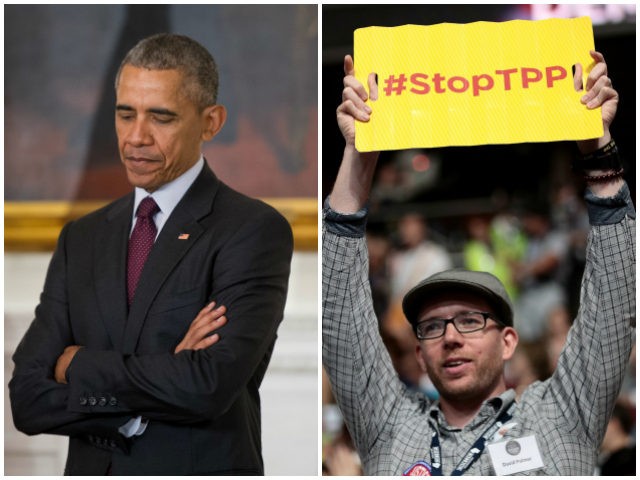Dean Baker writes at the Huffington Post writes about the increasing unpopularity of President Obama’s Trans-Pacific Partnership (TPP), which has united the grassroots of both parties in opposition to it.
The prospects for the Trans-Pacific Partnership (TPP) are not looking very good right now. Both parties’ presidential candidates have come out against the deal. Donald Trump has placed it at the top of his list of bad trade deals that he wants to stop or reverse. Hillary Clinton had been a supporter as Secretary of State, but has since joined the opposition in response to overwhelming pressure from the Democratic base.
As a concession to President Obama, the Democratic platform does not explicitly oppose the TPP. However it does include unambiguous language opposing investor-state dispute settlement mechanisms – the extra-judicial tribunals that are an integral part of the TPP.
If the political prospects look bleak there also is not much that can be said for the economic merits of the pact. The classic story of gaining from free trade by removing trade barriers doesn’t really apply to the TPP primarily because we have already removed most of the barriers between the countries in the pact.
The United States has trade deals in place with six of the eleven countries in the TPP, so tariffs with these countries are already at or very near zero. Even with the other five countries, in most cases the formal trade barriers are already low, so pushing them to zero will not have much economic impact.
In its analysis of the TPP, the non-partisan United States International Trade Commission (ITC) projected that the gains from the deal in 2032, when its effects will be mostly realized, will be 0.23 percent of GDP. This is a bit more than a typical month’s growth. In other words, the ITC report implies that as a result of the TPP we can expect to be as wealthy on January 1, 2032 as we would be on February 10, 2032 without the TPP. That’s not the sort of thing that would ordinarily be a cause for big celebration.
And the ITC model is explicitly a full employment model. It rules out the possibility that the TPP could lead to a higher unemployment rate as a result of increased imports displacing U.S. workers. The ITC analysis also failed to include the negative growth effects of stronger and longer copyright and patent protection.
Both of these are forms of protection which translate into higher prices for drugs, software, and other protected products. The losses from this increased protectionism can easily exceed the projected gains from the tariff reductions in the TPP.
The stronger patent and copyright protection are really at the core of the TPP. This is a deal that was crafted by and for the pharmaceutical industry, the software industry, the finance industry, the telecommunications industry, and other major industry groups. We essentially asked the major firms in these sectors to tell us what they wanted in a trade deal and then the Obama administration tried to get it for them.
That doesn’t make the TPP look like a good trade pact to most people, which is why it faces such bleak political prospects. But there is a lot of money riding on the TPP, so the Obama administration is not about to let it die a quiet death.
Read the rest here.

COMMENTS
Please let us know if you're having issues with commenting.